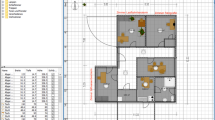Abstract
Psychological and social researches of last decades suggest that studying helping relationships may offer important suggestions for a better understanding of human behavior. In this work we present a study on the over-helping behaviors of teachers in their interaction with pupils, which may deepen our knowledge on how prosocial conducts can eventually produce unexpected effects over social interaction and cognitive development. To differentiate between helping and over-helping, we propose a taxonomy of communicative and non-communicative behaviors of teachers towards their pupils (Section 3), and an annotation scheme aimed to detect both helping and over-helping in teacher-pupil dyads (Sect. 4). Results of the study show how the annotation scheme presented allows to classify the different types of helping behavior, provides a reliable basis for the analysis of the teacher’s behaviors, and suggest hints useful to empower teachers’ self-reflection, in view of an improvement of the teacher-pupil relationship and of the pupils’ learning processes.
Access this chapter
Tax calculation will be finalised at checkout
Purchases are for personal use only
Preview
Unable to display preview. Download preview PDF.
Similar content being viewed by others
References
Nadler, A.: Autonomous and dependent help seeking: Personality Characteristics and the seeking of help. In: Sarason, B., Sarason, I., Pierce, R.G. (eds.) Handbook of personality and social support, pp. 258–302. Plenum, New York (1997)
Leone, G. (ed.): Le ambivalenze dell’aiuto. Teorie e pratiche del dare e del ricevere. Unicopli, Milano (2009)
Gilbert, D., Silvera, D.: Over-helping. Journal of Personality and Social Psychology 70, 678–690 (1996)
Vygotskij, L.S.: Mind in society. In: The development of higher psychological processes. Harvard University press, Cambridge (1978)
Vygotskij, L.S.: The genesis of higher mental functions. In: Wertsch, J.V. (ed.) The Concept of Activity in Soviet Psychology. M.E. Sharpe, Armonk (1981)
Raymond, C.E.: Cognitive Characteristics. In: Learners with Mild Disabilities, pp. 169–201. Allyn & Bacon, A Pearson Education Company, Needham Heights (2000)
Hartman, H.: Scaffolding & Cooperative Learning. In: Hartman, H. (ed.) Human Learning and Instruction, pp. 23–69. City College of City University of New York, New York (2002)
Mastrovito, T.: Giochi di simulazione e video-feedback: una proposta metodologica. In: Leone, G. (ed.) Le ambivalenze dell’aiuto. Teorie e pratiche del chiedere e del ricevere, pp. 69–112. Unicopli, Milano (2009)
D’Errico, F., Leone, G.: Giocare ad aiutare. L’uso di un gioco di simulazione come possibilità di osservazione e di auto-valutazione del sovra-aiuto materno in presenza di una malattia cronica infantile. In Psicologia della salute 1, 91–106 (2006)
D’Errico, F.: Il sovraiuto materno nella malattia cronica infantile: aspetti comportamentali, emozionali e autoriflessivi. In: Leone, G. (ed.) Le ambivalenze dell’aiuto. Teorie e pratiche del dare e del ricevere, pp. 113–172. Unicopli Editore, Milano (2009)
D’Errico, F., Leone, G., Mastrovito, T.: The paradox of over-help. When teacher’s intervention makes an immigrant child more dependent. In: Berg, W. (ed.) Multicultural classes. Verlag GmbH, Wies-baden (in press)
Poggi, I., D’Errico, F.: Social Signals and the action – cognition loop. The case of over-help and evaluation. In: Proceeding of IEEE International Conference on Affective Computing and Intelligent Interaction, New York (2009)
Leone, G.: Interpersonal, social and societal signals in successful and unsuccessful scaffolding. In: Social Signal Foundation. An Outline. International Meeting of the SSPNet, Rome, December 3-5 (2009)
Rapporto Caritas-Migrantes. Dossier statistico immigrazione. Idos- Centro studi e ricerche, Roma (2007)
Poggi, I.: Mind, hands, face and body. In: Goal and belief view of multimodal communication. Weidler, Berlin (2007)
Author information
Authors and Affiliations
Editor information
Editors and Affiliations
Rights and permissions
Copyright information
© 2010 Springer-Verlag Berlin Heidelberg
About this paper
Cite this paper
D’Errico, F., Leone, G., Poggi, I. (2010). Types of Help in the Teacher’s Multimodal Behavior. In: Salah, A.A., Gevers, T., Sebe, N., Vinciarelli, A. (eds) Human Behavior Understanding. HBU 2010. Lecture Notes in Computer Science, vol 6219. Springer, Berlin, Heidelberg. https://doi.org/10.1007/978-3-642-14715-9_13
Download citation
DOI: https://doi.org/10.1007/978-3-642-14715-9_13
Publisher Name: Springer, Berlin, Heidelberg
Print ISBN: 978-3-642-14714-2
Online ISBN: 978-3-642-14715-9
eBook Packages: Computer ScienceComputer Science (R0)




